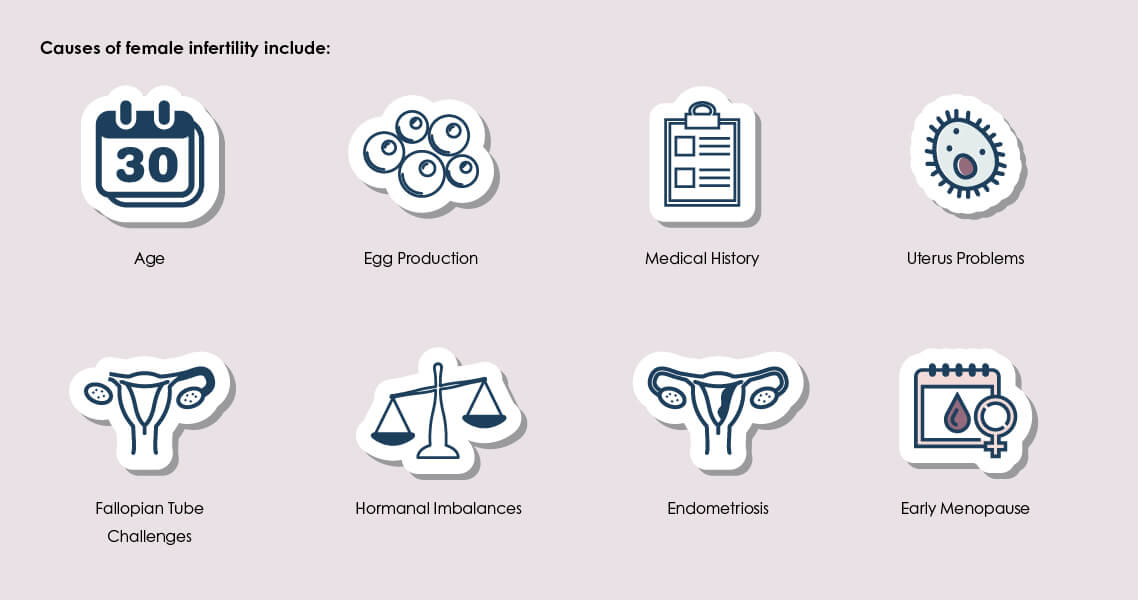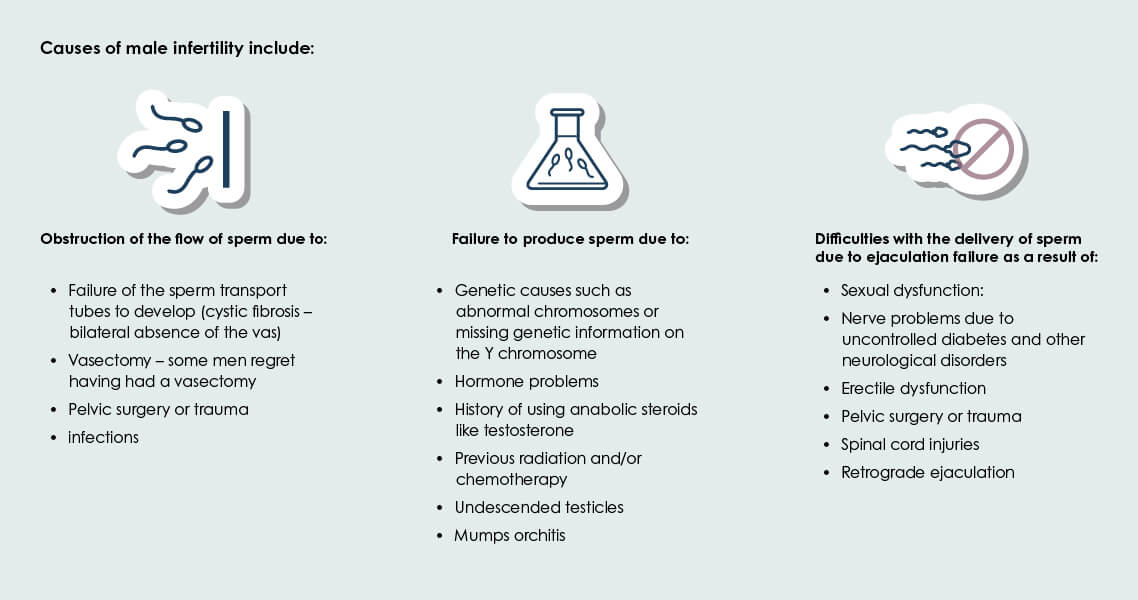Causes of Infertility
What is Infertility?
Approximately 1 in 6 couples in Canada experience infertility
The term ‘Infertility’ typically refers to a lack of conception after a reasonable period of sexual intercourse without contraception. This is typically one year for women who are under 35 year of age and 6 months for women over 35 years of age.
Infertility affects both male and female partners.
- 30% of the time, the cause is due to male factors
- 40% of the time, the cause is due to female factors
- 15% of the time, the cause is a mix of both male and female factors
- 15% of the time, no explanation can be determined for the cause
Source: Government of Canada
healthycanadians.gc.ca

Female Infertility
Causes of infertility in Women Include:
- Age (fertility decreases significantly after age 35)
- Problems producing eggs (which shows up when a woman has irregular or absent period or menstrual cycles)
- Sexually transmitted infection (such as Chlamydia)
- Problems in the uterus (i.e. fibroids or polyps)
- Problems with the fallopian tubes (missing tubes or blockages)
- Endometriosis (excess of tissue that gathers around the reproductive organs)
- Hormonal imbalances
- Early menopause (before age 40)

Male Infertility
- Poor sperm quality – their rate of movement and shape
- Low sperm count, or lack of sperm
- A history of sexually transmitted infection (STI)
- Hormonal imbalances

Fertility and Age
Age is one of the main factors that impact fertility, primarily for women, but also for men. Female fertility is generally measured by a woman’s ovarian reserve, i.e., egg count and quality. By the time a woman reaches age 40, the quantity and quality of eggs become significantly depleted, which can make it challenging to get pregnant naturally. Men, on the other hand, can continue to produce sperm at older ages. However, there is a higher risk of having low sperm count, poor-quality sperm (e.g., weak motility or movement, abnormal morphology or shape), or sperm with fragmented DNA, which can cause chromosomal abnormalities in embryos or miscarriage.
Fertility Treatment for 40+ Patients
While getting pregnant naturally after 40 is possible, most 40+ aspiring parents turn to fertility treatments like in vitro fertilization (IVF) to have a child. At Regional Fertility Program, we offer 40+ patients several advanced fertility treatment options to give them the best chances of successfully conceiving. Used in conjunction with IVF, some of these options include:
- Preimplantation Genetic Testing for Aneuploidy (PGT-A): PGT-A screens embryos to see if they have the correct number of chromosomes. Having an irregular number of chromosomes is the most common cause of implantation failure and miscarriage, especially for aspiring parents 40 and older. Abnormal chromosome counts can also cause a myriad of conditions, including Down syndrome. PGT-A helps to improve IVF outcomes by identifying embryos with a normal number of chromosomes for implantation.
- Frozen Embryo Transfer (FET): FET involves cryopreserving embryos after creation and then thawing them later for transplantation in the uterus. FET allows aspiring parents to have more control over their IVF cycle by timing embryo transfer to coincide with an optimized uterine environment. This can be especially important for patients 40 and older, who are more likely to face embryo implantation issues.
- Intracytoplasmic Sperm Injection (ICSI): ICSI involves fertilizing an egg by injecting a single healthy sperm cell directly into the egg. This procedure is often recommended in cases of severe male infertility, which becomes increasingly common at older ages.
- IVF Using Donor Eggs, Sperm, or Embryos: If unable to conceive using your own gametes, egg and sperm donation are excellent alternatives. Donated eggs and sperm are obtained from thoroughly screened donors to ensure intended parents have higher chances of success. Another option is using a donated embryo. Egg, sperm, and embryo donation have helped many aspiring parents ages 40 and older successfully achieve their family-building dreams.
- Gestational Surrogacy: Gestational surrogacy is when a woman, known as a gestational carrier, agrees to carry a child and give birth for another family. Surrogacy may be recommended in cases where the intended mother has uterine issues or other health concerns that make pregnancy and labor risky.


